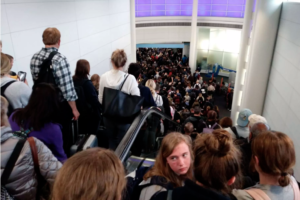Rep. Krishnamoorthi investigation finds lax airport screenings in March

An oversight panel Krishnamoorthi chairs found the Trump administration on March 14 “put passengers at risk” at O’Hare and other airports.
A House panel chaired by Rep. Raja Krishnamoorthi, D-Ill., investigating lax airport screenings found the Trump administration “did little” in early March to screen passengers arriving in the U.S. from Italy and South Korea, COVID-19 hotspots, and never thought to prepare for an onslaught of travelers landing at O’Hare Airport from Europe.
“The administration lost critical time it could have used to prepare and build up capacity to mitigate,” Krishnamoorthi, who chairs the Oversight Committee panel on economic and consumer policy, said in a statement.
President Donald Trump frequently points to his “closing down” China travel order on Jan. 31, as if that was the only entry point for the swelling coronavirus pandemic. Moreover, the China ban was porous, covering only non-U.S. citizens.
Krishnamoorthi’s panel was briefed by the Centers for Disease Control and Prevention; Customs and Border Protection; a part of the Department of Homeland Office; and received written information from the State Department, the agencies responsible for screening passengers.
A source told the Chicago Sun-Times questions about social distancing problems at O’Hare Airport were put to the agencies as part of the inquiry.
As the infections were quickly spreading, Trump imposed a European travel ban. Passengers arriving at O’Hare starting March 14 sounded an alarm by posting photos of thousands of unmasked people penned into waiting areas to be screened, with no possible way to practice social distancing.
The investigation found the Trump administration on March 14 “put passengers at risk by failing to consider social distancing at airport bottlenecks.”
Agents from the Centers for Disease Control, Customs and Border Security and the Department of Homeland Security “were so focused on getting staffed up ‘to process the people’ that they did not address the need for social distancing measures. None of the agency officials who briefed the Subcommittee recalled any conversation about social distancing prior to March 14,” the panel found.
“A senior CDC official stated that there would be no way to know if people got sick in those lines because people were coming back from countries with community transmission.”
While Trump has been trying to block congressional oversight work, the Krishnamoorthi panel has been able to carry out its watchdog function.
The investigation found:
*In early March, White House officials decided to rely on Italian and South Korean screeners who they did not control.
“U.S. officials relied on their foreign counterparts to conduct coronavirus screenings and depended on airport visits and verbal commitments to ensure that they were done,” Krishnamoorthi said in a tweet.
*Very few passengers were denied boarding by Italian and South Korean screeners. There were 13 passengers prevented from boarding flights to the U.S. in Italy in the first two weeks in March; only 56 passengers were stopped in South Korea.
*The Center for Disease Control did not have anyone on the ground in Italy to monitor screenings. The CDC did have a liaison in South Korea.
*Once landed in the U.S., passengers from Italy and South Korea were not subject to enhanced screenings until March 14 – even though the CDC did advise Americans in late February not to visit those nations — or told “about how to self-isolate for 14 days, contrary to advice from the World Health Organization.”
On March 18, there were three fatalities in Illinois; on Thursday, the total fatalities in the state totaled 3,111.
Author: Lynn Sweet
Source
